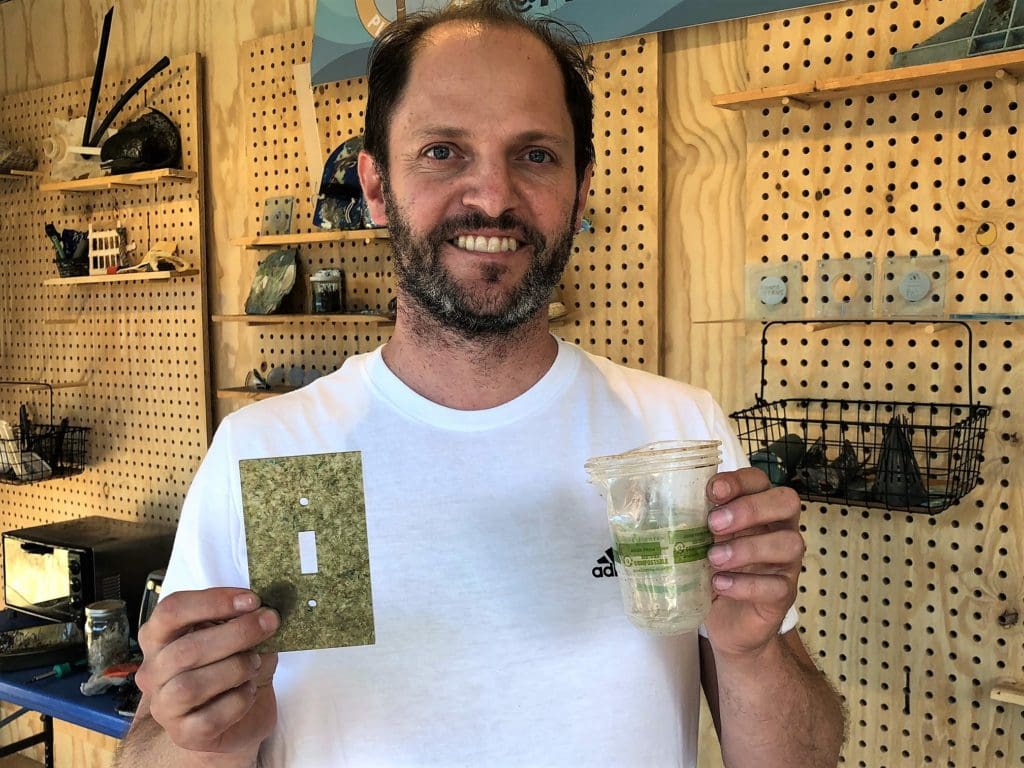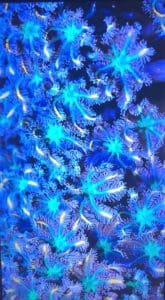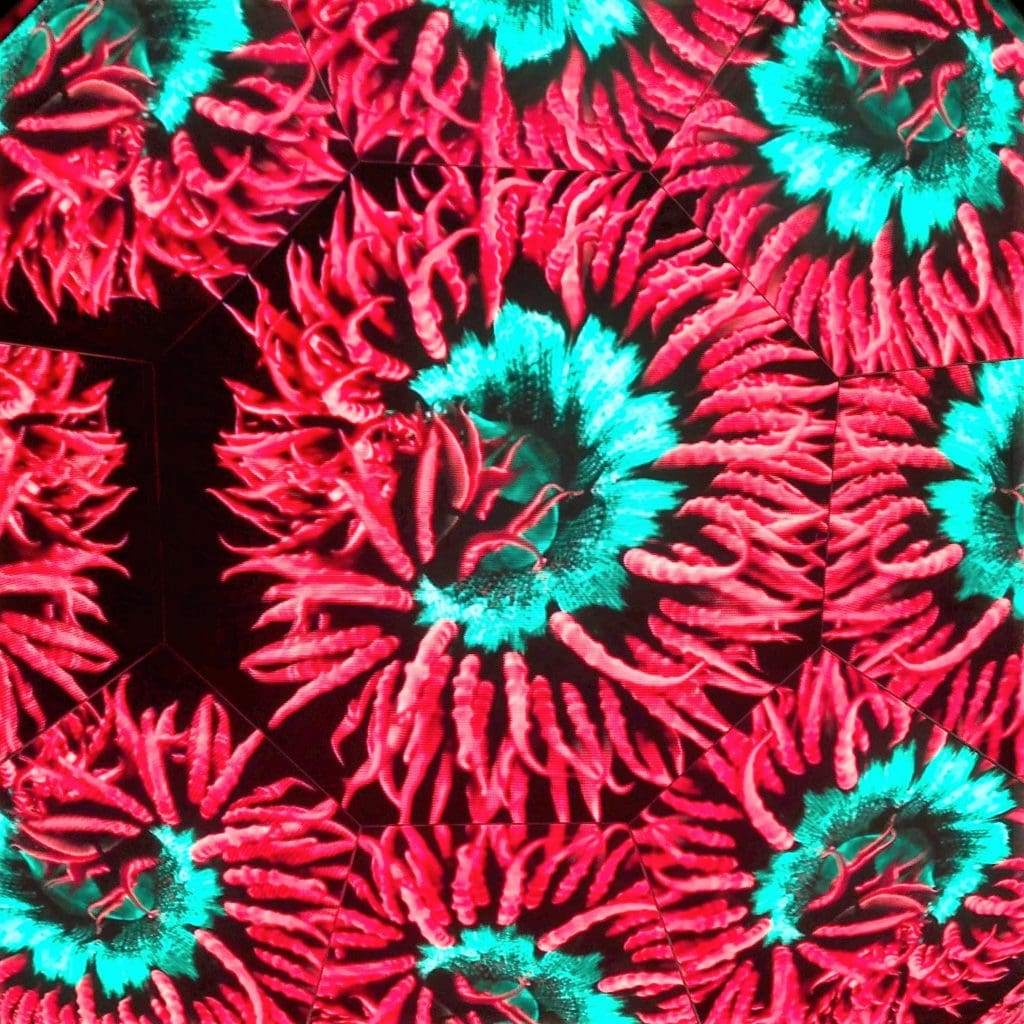
Marcus Rosenthal of Precious Plastic LA showed this light switch plate that was made from plastic. The three steps to keep plastic from the oceans are 1) avoid it, 2) intercept it, and 3)redesign it.
Plastic: Bane for Oceans
More than 1,000 people attended an event sponsored by adidas and Parley in Temescal Canyon Park last June.
Although many residents complained about the concert that was held in conjunction with the event, the sole purpose was to educate the public about the amount of plastic that ends up in the oceans.
Pacific Palisades residents recycle our water bottles, so we are not responsible, correct? Wrong.
The contents of the recycling bins around town go straight to trash, because there’s no bin for it. Additionally, the plastic and cans are contaminated with trash. There is no recycling at City parks.
According to July 2017 National Geographic story “A Whopping 91 percent of Plastic Isn’t Recycled.”
Plastic used to be sent to U.S. recyclers, who shredded or bundled it and sent it to China.
Marcus Rosenthal of Precious Plastic LA told this reporter that only about 10 percent of what we throw in recycling bins is recycled now that China has adapted a new policy, “Green Fence,” only accepting clean plastic–and barring many kinds they used to accept.
Prior to the new policy, China’s recycling processors contributed heavily to the air and water pollution. The plastic that couldn’t be recycled was heaped onto “trash mountains.”
According to Marcus, plastic waste is also difficult to recycle, because different types of plastic has different chemical compositions, and separating different types of plastic from each other is labor-intensive,
Now, according to the National Geographic, 79 percent of plastic is accumulating in landfills or sloughing off in the natural environment as litter, which means it is ending up in the ocean.
And, “If present trends continue, by 2050, there will be 12 billion metric tons of plastic in landfills.”
At the Temescal event, participants learned that since 1950, 90 percent of big fish species have disappeared, and 90 percent of seabirds and more than half the world’s sea turtles have plastic in their stomachs.
“We are hosting Run for the Oceans with adidas to reflect on how important the sea is for every one of us, said Cyrill Gutsch, Founder of Parley for the Oceans. “Plastic is everywhere, a design failure which harms sea life and human health. While we can’t phase it out overnight, we can stop making more. Clean Waves is the urgently needed fundraising platform where creators support our movement by designing products from Ocean Plastic, a premium material made from upcycled marine plastic debris.”
At the Temescal event, there were educational booths to draw awareness to the growing problem. One booth had stunning photographs/animation of ocean scenes. At another site, participants were able to take a pledge that they would help the oceans and yet, at a third site, the concept of 1) avoid plastic; 2) intercept it, and 3) redesigning plastic was emphasized. (visit:.parley.tv/updates/2015/9/12/air-strategy-swrwk)
As one innovative way of dealing with plastic water bottles, Parley turned the bottles into an energy‐return BOOST™ midsole and 95% Parley Ocean Plastic™ Primeknit upper. Each pair prevents about 11 plastic bottles entering the oceans.
“At adidas, we believe that through sport, we have the power to change lives and the Run for The Oceans movement reflects this,” said adidas General Manager Andre Maestrini. “We have created a unique global platform that gives everyone the opportunity to impact their lives by joining a collective running movement that fights marine plastic pollution.”
Visit: adidas.com/Parley.



‘The contents of the recycling bins around town go straight to trash, because there’s no MARKET for it.’ (This, right ?) It’s the central problem, now that China has begun to refuse our recycling. Is it possible there will now emerge a strong domestic recycling industry ? Right here in LA the potential is enormous. And as I understand it, the LA Recycling Programs are continued even tho most of the recycling goes to landfill (this kills me) because the programs in place have already trained people to recycle – and gives them hope (or the illusion) they are doing good. But how long will that last when the reality becomes better known ? We need a local recycling industry which will allow the LA area to become 100% recycling efficient. Otherwise, what is the use ?
Jeff, I agree. Makes me sick. We live part time in Palm Springs. The waste management company that we use is fantastic. It’s called Burtec and it’s a family run business. It recycles all sorts of plastics and styrofoam. I toured the facility and it was very impressive. So impressive in fact, that if there is something that I think the Palisades recycling might not take, I’ll save it and toss it in our PS recycling instead. It makes my stomach churn to think of recycling being combined with trash.